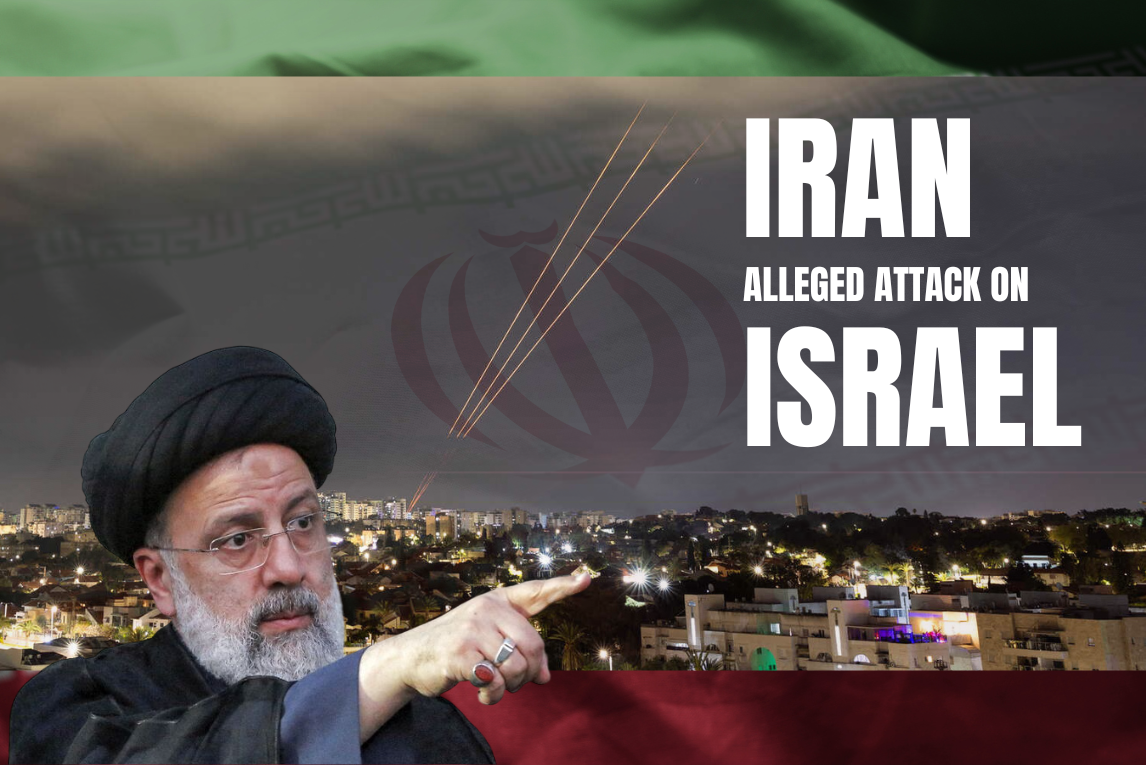News of Israel and Iran: Israel-Palestine conflict has seen a drastic escalation since Iran’s reported missile strikes against Israel, signaling a dramatic turn. To understand the full scope and ramifications of this escalated crisis, one must analyze all relevant aspects, such as the recent assault on the Iranian embassy in Iraq and the subsequent response by Iranian troops against Israel.
A Concise Summary of the 1948 Israel-Palestine Conflict
From the late 19th to early 20th centuries, Arab nationalism and Zionism became prominent forces in the Middle East, marking the start of Israel-Palestine conflicts. At its center lie divergent national ambitions between Palestine and Judaism regarding an area historically known as Palestine.
After World War I, Britain assumed authority over Palestine under a mandate from the League of Nations intending to create a “national homeland for the Jewish people.” As a result, Jewish immigration to Palestine increased significantly, which caused tension with Arab inhabitants who opposed any attempt at creating a Jewish nation-state on their soil.
After the establishment of Israel in 1948, conflict escalated rapidly with Palestinians being forcibly removed from their residences, creating an ongoing refugee situation that remains unsolved today. Subsequently, multiple conflicts, intifadas (revolts), and repeated episodes of violence ensued throughout the region, causing significant human and material casualties on both sides.
Assault on the Iranian Embassy in Iraq
The news of Israel and Iran reported an attack against Iran’s embassy in Iraq, further heightening tensions between Iran and its adversaries. Iran blamed this incident on Israel; thus adding another layer of complexity to this volatile situation.
Initial reports indicate that the Iranian Embassy in Baghdad, Iraq’s capital city, was attacked with multiple rocket launches targeting their compound, leading to damage and prompting increased security measures in its area.
Although no casualties were reported from this attack, its occurrence has nonetheless escalated tensions between Iran and its adversaries – in this instance Israel. Iran strongly denounced this event and has accused Israelis of orchestrating it; although Israel has neither confirmed nor denied their role.
Analysis and consequences
The assault on the Iranian embassy in Iraq occurred within a wider intensification of conflicts between Iran and Israel, characterized by purported missile assaults and retaliatory actions. The assault on the embassy is widely regarded by analysts as a component of a larger sequence of reciprocal actions and retaliations that pose a significant risk of escalating beyond control and engulfing the region in a more extensive conflict.
Iran has pledged to respond to the assault on its embassy, heightening apprehensions regarding the likelihood of additional escalation and the participation of neighboring nations. The attack further highlights the intricate and diverse nature of the conflict, involving various actors and their respective interests.
Iran’s Response to Israel
Iran has responded to the reported attacks on its embassy and the overall increase in hostilities by launching more missile strikes specifically aimed at Israeli positions. Iranian defense forces have allegedly attacked Israeli military bases, strategic installations, and infrastructure, showcasing Iran’s military prowess and determination.
The Iranian response signifies a notable intensification in the conflict and highlights Iran’s readiness to directly confront Israel using sophisticated military assets. The attacks serve various strategic purposes for Iran, such as retaliating against perceived acts of aggression, deterring future Israeli attacks, and demonstrating solidarity with Palestinian factions.
Iran is suspected to have initiated a sequence of missile assaults, specifically aimed at various locations within Israel, marking a notable escalation. The attacks, allegedly perpetrated by militia groups supported by Iran, have sparked concerns regarding the escalation of the conflict and the potential participation of regional powers.
The hallmarks of the attacks
As per Israeli defense officials, Iran aimed the missile attacks specifically aimed at multiple significant sites, such as military bases, strategic infrastructure, and civilian areas. The assaults, originating from Syrian positions controlled by Iranian-backed militias and potentially other areas, indicate a notable intensification of Iran’s engagement in the conflict.
The Israeli defense forces have promptly retaliated to the attacks by carrying out airstrikes on suspected Iranian and militia positions in Syria and other areas. The Israeli government has also pledged to safeguard its citizens and territory from any potential dangers, indicating a resolute position against Iran’s purported aggression.
Iran’s intentions and aims
Assaults allegedly perpetrated by Iran have come amid rising hostilities between Tehran and Israel over its nuclear program, regional influence, and support of proxy factions across the Middle East. Iran, an outspoken advocate of Palestinian factions, has consistently opposed Israel’s policies towards them while calling on its occupation of Palestinian lands to end.
Analysts speculate that Iran’s purported attack against Israel may be part of its strategic response against Israeli airstrikes which have targeted Iranian and militia installations in Syria, while also showing Iran’s abilities and determination when facing perceived threats from Israel or its allies.
Geopolitical consequences
Iran’s participation in the Israel-Palestine conflict carries serious ramifications for its regional surroundings. A prominent regional power, Iran has consistently provided backing to Palestinian factions while often criticizing Israeli policies towards Palestinians.
Recent attacks are intensification and may draw other regional actors into the conflict, including Saudi Arabia, Turkey, and the United Arab Emirates which each play key roles in maintaining Middle Eastern stability and may feel pressure to either support one side over the other or intervene directly to stop further escalation of violence.
Response from the international community
The international community has expressed profound apprehension regarding the intensifying news of Israel and Iran thus, urged for an immediate halt to hostilities. The United Nations Security Council called an emergency session to address the situation. However, reaching an agreement on a resolution has proven difficult due to the divergent opinions and interests of member states.
Global leaders have called upon all parties to demonstrate self-control and participate in constructive discussions to peacefully resolve their disagreements. The United States, European Union, and other significant powers step in the diplomatic endeavors to reduce tensions and avert a complete and widespread regional conflict.
Humanitarian crisis
Amid the increasing violence, there is a growing apprehension regarding the humanitarian conditions in Gaza and other Palestinian territories. The conflict is disproportionately affecting civilians, who are experiencing casualties and extensive destruction.
Humanitarian organizations have demanded unfettered access to deliver aid and medical assistance to individuals impacted by the conflict. The global community must give utmost importance to safeguarding civilians and guaranteeing the continuous availability of humanitarian corridors for the delivery of essential relief supplies.
Conclusion
The purported missile strikes carried out by Iran against Israel, along with the assault on the Iranian embassy in Iraq and the subsequent acts of retaliation, have introduced a perilous and novel aspect to the Israel-Palestine conflict. The intensifying conflicts, which involve various participants and intricate reasons, add additional challenges to the goal of attaining a peaceful settlement.
The News of Israel and Iran is critical, and it is imperative to take immediate action to reduce tensions, facilitate communication, and prevent additional acts of violence. The international community should give priority to diplomatic efforts, actively involve all parties concerned, and strive for a comprehensive and inclusive resolution that tackles the underlying causes of the conflict and guarantees the security and welfare of all individuals in the region.










